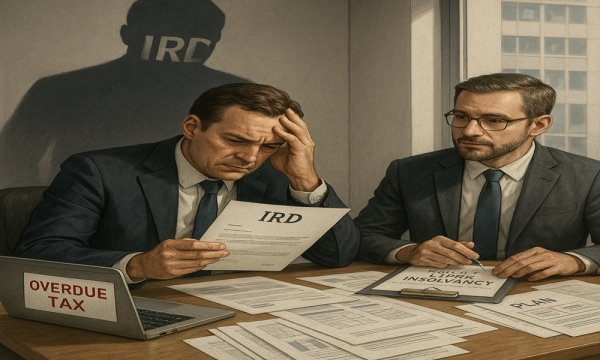When the IRD Comes Knocking: What Company Directors Need to Know
No business owner wants to see a letter from the Inland Revenue Department (IRD) land on their desk especially when the business is already under financial pressure. But whether it’s a late payment notice, an audit notification, or a formal demand, how you respond can have serious implications for your company and you personally as a director.
Here’s what to know when the IRD comes knocking, and how early engagement with a licensed insolvency practitioner can help protect your business, assets, and reputation.
- Why IRD Debt Matters More Than Most
IRD isn’t just another creditor. It has stronger enforcement powers than most including the ability to:
Garnish funds directly from your bank accounts or debtors
Charge penalties and compounding interest
Issue statutory demands
Pursue directors personally in certain situations (e.g. for PAYE or GST trust money)
Apply to liquidate your company
When tax arrears are involved, directors must act quickly and responsibly to avoid compounding the problem or exposing themselves to personal liability or risking breaches of their directors’ duties.
- Common IRD Triggers You Shouldn’t Ignore
Even if your business has been managing up until now, the following are signs that trouble may be brewing:
Missed GST, PAYE, or income tax payments
Reliance on tax arrears to manage cashflow, IRD is not a bank
Lack of timely IRD compliance (returns filed late or not at all)
Receiving a Notice of Assessment, Default Notice, or Statutory Demand
Ignoring these signs won’t make them go away in fact, it can escalate matters quickly.
- Director Risk: Personal Exposure Is Real
Directors are legally responsible for ensuring their company meets its tax obligations. This includes trust money such as PAYE collected on behalf of the IRD. If your company is insolvent and continues to incur tax debt, you could be at risk of:
Breach of Directors Duties claims under the Companies Act
Director penalties for PAYE or GST
This is why seeking advice early and documenting your actions is vital for protecting yourself.
- Your Options: Don’t Wait for Enforcement
IRD is generally open to working with businesses that engage early and transparently. Possible solutions include:
Payment arrangements or instalment plans
Restructuring advice, including business turnaround or voluntary administration
Formal compromise under the Companies Act, where appropriate
A licensed insolvency practitioner can help you negotiate with IRD, assess your company's solvency, and develop a strategy that balances compliance with business survival.
- What Not to Do
When IRD pressure builds, some directors take actions that later lead to legal and financial consequences. Avoid:
Transferring assets to related parties or new entities for minimal or no consideration
Taking drawings or loans while tax debt goes unpaid
Prioritising some creditors over others without advice
Trading while insolvent without a clear recovery plan
Ignoring communication from the IRD
All of these may lead to greater scrutiny and personal exposure if the company fails.
- Talk to a Licensed Insolvency Practitioner First
Whether your business is facing an IRD demand, audit, or long-overdue obligations, talking to a licensed insolvency practitioner gives you options. We can:
Clarify your legal position and risks
Engage with IRD on your behalf
Help you assess your company’s viability
Develop a restructuring or exit plan
Protect your personal and business assets where possible
Don’t Wait for the Knock
The earlier you seek advice, the more choices you’ll have and the less likely the situation is to spiral out of control. If your business has fallen behind on its taxes or you’re worried about IRD enforcement, we’re here to help.

